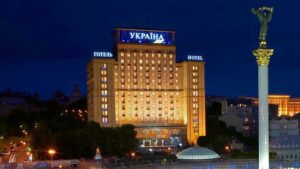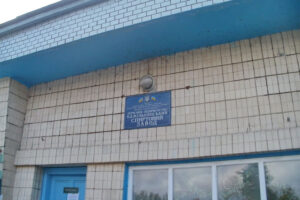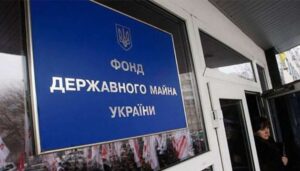
The State Property Fund of Ukraine (SPFU) has put up the single property complex of the State Enterprise Zhytomyr Distillery (Zhytomyr) for privatization at auction via Prozorro.Sale at a starting price of UAH 101.1 million, the SPFU press service reports.
According to the report, the asset includes 147 units of real estate, 47 vehicles, 1457 units of equipment, furniture, inventory, etc. It is noted that in addition, the single property complex includes a separate subdivision of the Chudniv branch of the Zhytomyr Distillery (Chudniv), non-residential premises (Vilshanka village), a built-in premises (Korosten district, Olevsk), an artesian well (Korochenky village) and two shops (Zvyagel and Lyubar village). The total area of the asset is 24,320 square meters.
The state-owned enterprise has two valid licenses: for the production of alcoholic beverages valid until April 10, 2026, and for the right to wholesale alcoholic beverages, except cider and perry, which is valid until December 27, 2026.
As of December 31, 2024, the carrying value of assets amounted to UAH 101 million 90 thousand, accounts payable – UAH 161 million 196 thousand, including UAH 11 million 133 thousand in payroll and UAH 26 million 349 thousand to the budget. The company employs 205 people.
The company has a protection agreement for a local cultural heritage site. All of the company’s property has been seized, and it is not leased. Registration for the auction will last until April 10 at 20:00. The auction will take place on April 11.

Revenue from the privatization of state property in 2024 increased 3.1 times (by UAH 6.75 billion) compared to 2023, to UAH 9.9 billion, according to the website of the State Property Fund (SPF) of Ukraine. According to the website, in 2015, privatization revenues amounted to UAH 0.2 billion, in 2016 – UAH 0.2 billion, in 2017 – UAH 3.4 billion, in 2018 – UAH 0.3 billion, in 2019 – UAH 0.5 billion, in 2020 – UAH 2.2 billion, in 2021 – UAH 5.1 billion, in 2022 – UAH 1.7 billion, in 2023 – UAH 3.15 billion.
“In 2024, the SPFU managed to set a new record for privatization proceeds,” the agency stated.
In total, last year the Ukrainian budget received UAH 11.1 billion from privatization, in addition to UAH 9.9 billion in revenues, another UAH 1.2 billion was VAT.
At the same time, the sale of small-scale privatization objects brought in almost UAH 3.5 billion, with the most expensive lot being the Kyiv Kozatsky Hotel (UAH 0.4 billion), and two large-scale privatization assets – the capital’s Hotel Ukraine and the United Mining and Chemical Company – provided UAH 6.45 billion in budget revenues.
In 2024, the SPF also began to auction state assets with no book value or zero book value at a starting price of UAH 1. These auctions were highly competitive.
“We offer the market a wide range of objects: from large facilities to single property complexes for business development and real estate. Thanks to this, everyone can find options for investment. Over the past decade, privatization has become more transparent and its results have improved significantly,” said Ivanna Smachylo, acting head of the SPF.

The State Property Fund (SPF) of Ukraine has announced an auction for the privatization of the Ukraina Hotel with a starting price of UAH 1 billion 47.6 million. According to the SPFU press service, applications for participation in the auction scheduled for September 18 will be accepted until September 17. The guarantee fee is UAH 52.3 million.
The lot includes 14 registered units of real estate and infrastructure, including a hotel building; two security buildings; two non-residential buildings; two parking lots, etc. The total area is 26.3 thousand square meters.
According to the results of January-March 2024, the net loss of SE Hotel Ukraine amounted to UAH 3.1 million. In addition, as of March 31, it had wage arrears (UAH 3.8 million), overdue accounts payable (UAH 21 million), and budgetary debts, namely personal income tax (UAH 4.7 million), tourist tax (UAH 1.4 million), and land tax (UAH 4.5 million).
The privatization terms stipulate that the company’s core business (hotel operations) will be maintained for five years, that wage and budget debts will be paid within six months of the transfer of ownership, that social guarantees will be provided to employees in accordance with the law and that they will not be dismissed within six months, and that environmental legislation will be complied with.
As reported, in April, the Cabinet of Ministers of Ukraine included Hotel Ukraina in the list of large-scale privatization objects. In May, the auction commission set the starting price for the privatization of the Ukraina Hotel at UAH 1 billion 47 million 637 thousand 152.
The Ukraine Hotel is a state-owned enterprise managed by the SPFU. The 14-story, 4-star hotel has 363 rooms, six conference halls and meeting rooms. There is a parking lot for 80 cars and a shelter with a separate auditorium for 50 people. The total area of the building is 22.4 thousand square meters.

The State Property Fund (SPF) has put up the Bdzhylnya Distillery in Vinnytsia region for privatization at an online auction with a starting price of UAH 68.5 million, said Vitaliy Koval, head of the SPF.
“The modernization of the production will help ensure economic efficiency for the new owner, as Vinnytsia region is a leader in the production and export of agricultural products. This gives the company logistical advantages and access to resources,” he explained on Facebook.
According to the report, the state-owned enterprise specializes in the production of alcohol and other chemical products of organic origin, but has not been carrying out financial and economic activities since June 2022.
The unified property complex of the Bdzhilnyansky distillery consists of 99 real estate objects with a total area of 11570.6 square meters, 23 units of transport and special equipment, as well as 727 units of equipment.
The online auction will take place on June 24 in the Prozorro.Sale electronic trading system.
Koval reminded that in 2024, the agency successfully held 4 online auctions for the sale of alcohol industry facilities. Their final value amounted to UAH 126.8 million, which is on average 2.1 times higher than the starting price.
“As a result, the enterprises get new owners and investments for modernization, and the budget receives funds from fair and competitive sales. We continue to work on the denationalization of the alcohol industry through privatization to unlock its potential,” summarized the SPFU chairman.
According to the SPF, distilleries are among the most popular assets for small-scale privatization. The agency planned to fully complete the privatization of alcohol industry enterprises in 2023, for which it was going to hold online auctions for the sale of 26 distilleries across the country. However, some of them did not take place.

The State Property Fund of Ukraine (SPFU) is finalizing the list of large-scale privatization objects to be agreed with the Cabinet of Ministers and submitted to the auction commission, said Vitaliy Koval, head of the agency.
“Large-scale privatization is when an asset is worth more than UAH 200-250 million at its book value or starting price. Today, the official list has been approved, all large-scale privatization objects must go through the procedure of approval by the Cabinet of Ministers, be included in the list and transferred to the auction commission under the regulation of the minister, who will approve the data on the auction conditions,” he said at the Business Breakfast with Forbes Ukraine on Wednesday.
Koval named 66.65% of the Ocean Plaza shopping mall (Kyiv), which will be put up for privatization at a starting price of UAH 1.63 billion, and one of the pre-war leaders in the aerated concrete market, AEROC Investment Deutschland GmbH, with three production sites at a price of about UAH 1 billion, as the most valuable assets included in the list of large-scale privatization. Among the state-owned assets, the Ukraina Hotel (Kyiv) will be put up for privatization at a price of UAH 1.8 billion.
In addition, the assets of the United Mining and Chemical Company (UMCC), which has been given control of the Vilnohirsk Mining and Metallurgical Plant (VGMK, Dnipro region) and Irshansk Mining and Processing Plant (IGOK, Zhytomyr region), will be auctioned at a starting price of UAH 3.7-3.9 billion.
“We have a task from the Ministry of Finance – UAH 4 billion (to replenish the state budget in 2024 – IF-U). But I am confident that we will exceed it. The ambitious price is much higher,” said the SPF head.
Speaking about the target audience that the SPF is interested in transferring privatization objects into ownership, Koval said that the Fund manages a variety of assets: from a small shop, hair salon, service center and tailoring studio to large objects such as the UMCC. Accordingly, the target audience is very diverse – from individuals to corporations.
“A very cool client for us is someone who comes for the second, third, or fourth time. In addition, when it comes to international business, international groups that already have business in Ukraine, understand the country’s agenda, and are familiar with the context and feel the microclimate are of the greatest interest. Such clients are very important to us. As well as domestic investors who have small and medium-sized businesses – they are needed,” summarized the head of the SPF.

The State Property Fund of Ukraine (SPFU) has put up for privatization the Shabalynivka distillery in Chernihiv region.
“This facility is a promising brownfield waiting for an investor to restore it. The privatization of the plant opens up opportunities for the development of an industrial site with existing infrastructure,” said Vitaliy Koval, head of the SPF, on Telegram.
According to the report, the plant is located in the village of Ivanivka, Nizhyn district, near the lake and the M-02 and T-2523 highways.
The single property complex includes 51 real estate objects (12,312 thousand square meters), two land plots with an area of 56.46 hectares, three cars and 250 movable property items (equipment, furniture, etc.).
The new owner is obliged to pay off the company’s existing wage arrears of UAH 552 thousand and UAH 21.17 million to the budget. The terms of the sale include the preservation of jobs for six months.
The starting price of the lot is UAH 959.1 thousand (excluding VAT).
The online auction will take place on May 16 in the Prozorro.Sale system. Bids will be accepted until May 15 inclusive.
“The privatization of Shabalynivka Distillery is a chance for investors to realize their business ideas on the basis of existing production facilities and infrastructure. The new owner will be able to diversify its activities and create added value,” said the SPF chairman.
According to the Fund, distilleries are one of the most popular small-scale privatization assets. Since September 2022, the SPF has sold 14 distilleries and raised UAH 965 million to the state budget, with the average price of each object at auction tripling.
The SPF planned to fully complete the privatization of the alcohol industry in 2023, for which it was planned to hold online auctions for the sale of 26 distilleries across the country. However, a number of them did not take place.